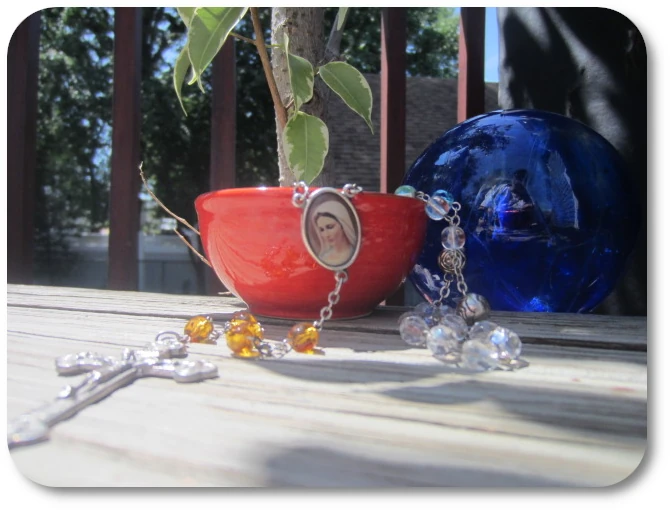- Rosary
- Luminous Mysteries
- The Eucharist
The Eucharist
The Bread of Life
The Eucharist, also known as Holy Communion, stands as the cornerstone of Christian faith and worship.
Rooted in Jesus Christ's teachings, it symbolizes His sacrifice and unending presence among His followers.
Believers share in the divine mystery of Christ's body and blood, a promise of eternal life for all who embrace His truth.
The Eucharist

A Sacred Gift for Catholics.
For Catholics, the Eucharist is more than just a symbol; it is the heart of our faith, a sacred gift that embodies the true presence of Jesus Christ.
Every time I participate in the Holy Mass, I am invited to partake in this mystery a true act of love that unites heaven and earth.
I personally practice awareness when receiving the Holy Eucharist to have reverence and feel honored to participate.
It is also known as Holy Communion, commemorates the Last Supper, where Jesus shared bread and wine with His disciples.
During that moment, He established a covenant that would forever define the Catholic faith. Jesus said, "This is my body, which will be given up for you. Do this in memory of me."
These words echo in every Catholic church during the celebration of the Mass, reminding us of His ultimate sacrifice on the cross.
For Catholics, it is not merely a ritual or tradition it is the real presence of Christ.
Through the process of transubstantiation, the bread and wine are transformed into the Body and Blood of Jesus. While the outward appearance remains the same, the essence becomes divine.
Receiving communion is a deeply personal and communal experience. On an individual level, it is a moment of intimacy with Christ. Through this sacrament, we are spiritually nourished, our sins forgiven, and our souls strengthened. On a communal level, the Eucharist unites us as one body in Christ. It bridges divides and reminds us that we are part of a global family of believers.
It is not simply a memory of what Jesus did for us; it is an ongoing reality, a living encounter with His love and grace. Whether you're a lifelong Catholic or someone seeking to deepen your faith and even someone like me coming back to my faith, it invites us to reflect on the boundless mercy of God and our call to live in His love.
As we reflect, let us remember its transformative power. It is more than bread and wine; it is the very essence of Christ's presence among us. When we approach the altar, may our hearts be open to the profound mystery of this sacrament and the everlasting love it represents. The Eucharist is a gift—a gift we are called to cherish, celebrate, and share.
The Scriptural Rosary
'I am the living bread which has come down from heaven. Anyone who eats this bread will live for ever.' John 6:51
'For my flesh is real food and my blood is real drink.' John 6:55
'Whoever eats my flesh and drinks my blood lives in me and I live in him.' John 6:56
After this, many of his disciples left him. Then Jesus said to the Twelve, 'Do you want to go away too?' John 6:66,67
Peter answered, 'Lord, to who shall we go? You have the message of eternal life.' John 6:68
'And we believe, and have come to know, that you are the Holy One of God.' John 6:69
Now on the night he was betrayed, the Lord Jesus took some bread, and broke it. 1 Cor 11:23; Mt 26:26
And he gave it to the disciples, saying, 'Take it and eat. This is my body.' Matt 26:26
Then he took a cup and gave it to them. 'Drink from this, all of you,' he said. Matt 26:27
'For this is my blood, the blood of the new covenant, which is to be poured out for many for the forgiveness of sins.' Matt 26:28
With permission from The Scriptural Rosary book written by Joanne & John Bolger
Published and permission from Christianica (America) Center
Understanding Transubstantiation

For the longest time, it was hard for me to understand transubstantiation. I would constantly question how true it is, that a priest could possibly change substance in something.
But just as praying over a plant helps it grow and has been proven, because using negative words can kill it. It is truly possible.
Transubstantiation is a central belief in the Catholic faith, deeply connected to the Eucharist. It refers to the mysterious transformation of bread and wine into the body and blood of Jesus Christ during Mass.
While the bread and wine still look, taste, and feel the same, Catholics believe that their true essence has changed through the power of God.
This belief is based on Jesus’ actions at the Last Supper, where He shared bread and wine with His disciples and told them, “This is my body” and “This is my blood.”
Catholics hold that during the Eucharist, the priest, acting in the role of Christ, repeats these sacred words. This moment is when transubstantiation takes place the bread and wine become Christ’s body and blood in a way that cannot be seen or physically measured.
For believers, transubstantiation is not just a concept; it is a profound act of faith. It allows them to experience a real connection with Jesus, as they receive Him in the form of the Eucharist. This doctrine highlights the deep mystery and power of God, reinforcing the idea that faith involves trusting in things that cannot always be fully explained or understood.
Ultimately, transubstantiation teaches Catholics that the Eucharist is not simply a symbol, but a true and living presence of Christ. It reminds them of His infinite love and sacrifice, giving them strength and grace to live their faith every day. This teaching continues to inspire awe and devotion, uniting believers in the shared mystery of God’s presence.
The Importance of Adoration

Adoration is a powerful way for Christians to deepen their relationship with God and honor His presence, especially through the Eucharist.
By spending time in adoration, believers reflect on the significance of Christ’s sacrifice and express gratitude for the gift of His body and blood. This practice is not just about prayer; it is about opening one's heart to the divine presence and experiencing peace and spiritual renewal.
Through adoration, Christians reaffirm their faith and find strength in their daily lives. It serves as a moment of connection and devotion, reminding them of God’s love and guiding them to live out their beliefs with greater purpose.
Whether in quiet contemplation or group worship, adoration helps believers draw closer to God and celebrate the profound mystery of the Eucharist.



















